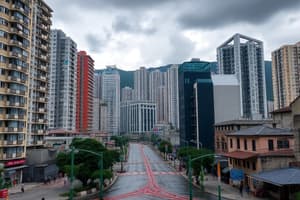Podcast
Questions and Answers
By how much has the annual mean temperature in Hong Kong increased from 1885 to 2020?
By how much has the annual mean temperature in Hong Kong increased from 1885 to 2020?
- 2.0°C
- 1.0°C
- 1.5°C
- 1.7°C (correct)
The number of cold days in Hong Kong has been increasing in recent decades.
The number of cold days in Hong Kong has been increasing in recent decades.
False (B)
What has been the general trend of the annual mean temperature in Hong Kong from 1885 to 2020?
What has been the general trend of the annual mean temperature in Hong Kong from 1885 to 2020?
The annual mean temperature has generally increased.
Since 1885, the climate of Hong Kong has been getting ______.
Since 1885, the climate of Hong Kong has been getting ______.
What is defined as a hot night in Hong Kong?
What is defined as a hot night in Hong Kong?
Which area has the highest annual mean temperature?
Which area has the highest annual mean temperature?
The annual number of cold days in Hong Kong has increased in recent years.
The annual number of cold days in Hong Kong has increased in recent years.
What is the estimated rise in annual mean temperature of Hong Kong by 2100?
What is the estimated rise in annual mean temperature of Hong Kong by 2100?
The annual mean temperature of Hong Kong has increased by about 2.7°C since 1885.
The annual mean temperature of Hong Kong has increased by about 2.7°C since 1885.
By 2100, it is possible that there will be only _____ cold days in Hong Kong.
By 2100, it is possible that there will be only _____ cold days in Hong Kong.
What phenomenon explains the temperature difference between urban and rural areas?
What phenomenon explains the temperature difference between urban and rural areas?
Match the following changes in Hong Kong's rainfall patterns with their descriptions:
Match the following changes in Hong Kong's rainfall patterns with their descriptions:
The _______ area is associated with higher temperatures. This is because the population and building density there are _______.
The _______ area is associated with higher temperatures. This is because the population and building density there are _______.
What is the main reason for higher temperatures in urban areas compared to rural areas?
What is the main reason for higher temperatures in urban areas compared to rural areas?
Visibility in Hong Kong has consistently decreased since the 1970s.
Visibility in Hong Kong has consistently decreased since the 1970s.
What phenomenon causes more frequent heavy rain and thunderstorms in urban areas?
What phenomenon causes more frequent heavy rain and thunderstorms in urban areas?
The heat island effect results in __________ temperatures in urban areas compared to rural areas.
The heat island effect results in __________ temperatures in urban areas compared to rural areas.
Match the following impacts with their associated conditions or phenomena:
Match the following impacts with their associated conditions or phenomena:
Flashcards
Hong Kong's Temperature Trend (1885-2020)
Hong Kong's Temperature Trend (1885-2020)
Hong Kong's average yearly temperature has risen by approximately 1.7°C since 1885, indicating a warming climate.
Recent Warming Rate (1991-2020)
Recent Warming Rate (1991-2020)
The rate of temperature increase in Hong Kong has accelerated in recent decades, compared to the overall period from 1885–2020.
Annual Mean Temperature
Annual Mean Temperature
The average temperature throughout a given year.
Effect of Warming on Hong Kong's weather
Effect of Warming on Hong Kong's weather
Signup and view all the flashcards
Climate Change in Hong Kong
Climate Change in Hong Kong
Signup and view all the flashcards
Hong Kong Temperature Rise
Hong Kong Temperature Rise
Signup and view all the flashcards
Hot Night Increase
Hot Night Increase
Signup and view all the flashcards
Very Hot Days
Very Hot Days
Signup and view all the flashcards
Decreased Cold Days
Decreased Cold Days
Signup and view all the flashcards
Increased Rainfall Intensity
Increased Rainfall Intensity
Signup and view all the flashcards
Heat Island Effect
Heat Island Effect
Signup and view all the flashcards
Reduced Visibility
Reduced Visibility
Signup and view all the flashcards
Urban Temperature
Urban Temperature
Signup and view all the flashcards
Hong Kong Visibility Improvement
Hong Kong Visibility Improvement
Signup and view all the flashcards
Heavy Rain Increase
Heavy Rain Increase
Signup and view all the flashcards
Hong Kong Temperature Trend (1885-Now)
Hong Kong Temperature Trend (1885-Now)
Signup and view all the flashcards
Heat Island Effect
Heat Island Effect
Signup and view all the flashcards
Warmer Hong Kong Areas
Warmer Hong Kong Areas
Signup and view all the flashcards
Urban vs. Suburban vs. Rural in Hong Kong
Urban vs. Suburban vs. Rural in Hong Kong
Signup and view all the flashcards
Annual Mean Temperature Ranking
Annual Mean Temperature Ranking
Signup and view all the flashcards
Study Notes
Hong Kong Climate Change
- Hong Kong's annual mean temperature has increased by 1.7°C since 1885, faster than the global average of 1°C.
- The rate of temperature increase has accelerated in recent decades.
- As Hong Kong gets hotter, the number of hot nights and very hot days increases, while cold days decrease.
- Annual rainfall has slightly increased, though the number of rainy days has decreased, meaning rainfall intensity is higher.
- There are more days with heavy rainfall (over 30 mm/hour) and extreme rainfall events (over 100 mm/hour).
- Cloud cover and thunderstorm days have increased.
- Wind speed in urban areas has decreased, while rural areas remain stable.
- Annual mean temperature in Hong Kong is predicted to rise by 3-6°C by 2100.
- Potential for summers to become longer and hotter, with possible loss of winters entirely by 2100.
- Possible loss of three cold days in Hong Kong by 2100.
- Global climate change and urban development are contributing factors to Hong Kong's changing climate.
Urban Development's Effect
- Increased urban areas, reduced vegetation cover, and taller buildings lead to a heat island effect, increasing temperatures.
- Converting rural areas to urban areas negatively impacts the local climate.
Possible Effects of Climate Change
- Increased risk of landslides, coastal flooding and storm surges given stronger typhoons and rising sea levels.
- Disruptions in traffic and peoples' daily routines due to extreme weather events will happen.
- Impacts on telecommunications due to extreme weather events.
- Increased food prices from reduced production elsewhere.
- Potential for increased heat stroke cases and spread of dengue fever.
- Damage to wildlife habitats in nature reserves due to rising sea levels and warmer seawater.
- Coral bleaching in marine habitats.
Studying That Suits You
Use AI to generate personalized quizzes and flashcards to suit your learning preferences.



